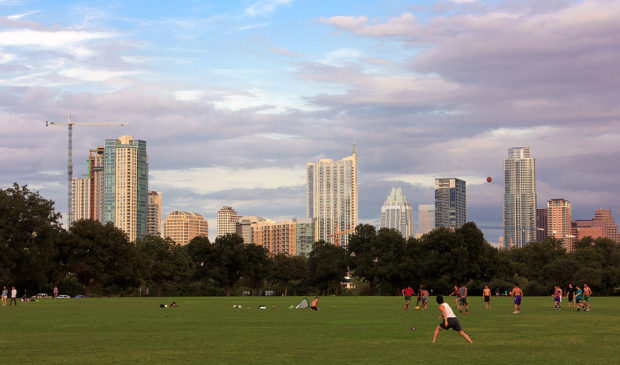Lodging industry slows push for hotel tax to fund housing, aid for homeless
Wednesday, January 13, 2021 by
Chad Swiatecki Leaders of the city’s lodging industry have slowed their push to create a new tax on hotel stays that would indirectly free up money to fund services for the homeless.
The Tourism Commission received an update at its Monday meeting about progress on the creation of a long-proposed Tourism Public Improvement District. Such a move would result in an additional 1 percent levy on guests on top of the current Hotel Occupancy Tax that funds some operations at the Austin Convention Center and local tourism efforts.
The Austin Hotel and Lodging Association had placed an item on the City Council agenda in December that was pulled because of questions from hotel owners and operators about how the tax would be implemented and used. Joe Bolash, board chair for the association, told the commission that media coverage of the item ahead of the meeting created concerns among hotel operators. If approved by Council, the TPID would also need to be approved by 60 percent of the hoteliers who would fall under its impact.
“We have not as an organization formally begun to solicit ownership approval … and wanted to make sure we had secured Council approval first,” Bolash said.
“It was a very aggressive time frame and perhaps in retrospect we should have given it a little time to breathe. There’s quite a few groups that are involved, and they need the time and space so they can understand and wrap their heads around exactly what it is.”
Bolash said the Hotel and Lodging Association hasn’t stated a time frame for bringing the item before Council, explaining that it needs to educate hotel owners while also engaging with new Council members Mackenzie Kelly and Vanessa Fuentes.
Commission members and Bolash also spent time parsing the legal maneuvering that would be necessary to reroute convention center money back to city coffers, with the expectation that the city would then use those funds for homelessness services and housing.
State law would allow money generated from the TPID to be used for sales, marketing and administration costs, with up to 40 percent of the money used to cover the budget for securing convention and event business. Once the TPID is created, an amount equal to that 40 percent could be redirected from the convention center to the city’s General Fund.
Commissioner John Riedie said the commission should soon pass a motion suggesting Council include a budget amendment tied to creation of the TPID that would formalize the redirection of convention center funds to the city, with that money specified for homelessness services.
The TPID was one of several proposals included in Mayor Steve Adler’s “downtown puzzle” effort that included the planned expansion of the convention center as well as the improvement of the Palm School and parks system known as the Waterloo Greenway.
The Tourism Commission recently approved the creation of a working group focused on the TPID, with commission members agreeing Monday that a study of the funding and budgeting process and wording for a possible request for Council should be its first items of business.
Commissioner Scott Joslove, who serves as president of the Texas Hotel and Lodging Association, said the commission would need to use very precise wording in asking Council to pass a budget amendment tied to the TPID because of the specific state laws governing how funds tied to it can be used.
“If you want to get a resolution where the City Council indicates their intention to allocate convention center revenues from (business expense) buydown, you can do that,” he said.
“You cannot get a resolution that would require that the TPID itself allocate money directly. That would contravene state law. It’s a very convoluted set of laws and practices that we’ve worked with city legal, and the convention center and the mayor’s office and lodging industry, to make sure we can pull it off within state law.”
Photo by Mwyzykowski0821 [CC BY-SA 4.0], from Wikimedia Commons.
The Austin Monitor’s work is made possible by donations from the community. Though our reporting covers donors from time to time, we are careful to keep business and editorial efforts separate while maintaining transparency. A complete list of donors is available here, and our code of ethics is explained here.
You're a community leader
And we’re honored you look to us for serious, in-depth news. You know a strong community needs local and dedicated watchdog reporting. We’re here for you and that won’t change. Now will you take the powerful next step and support our nonprofit news organization?



